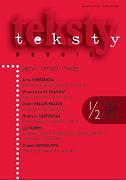Droga naukowa Anny Wierzbickiej. Od składni polskiej prozy renesansowej do semantyki międzykulturowej
Anna Wierzbicka: from Polish renaissance prose syntax to intercultural semantics
Author(s): Jerzy BartmińskiSubject(s): Literary Texts
Published by: Instytut Badań Literackich Polskiej Akademii Nauk
Keywords: Anna Wierzbicka; Linguistics; Primes; Semantics; Intercultural semantics;
Summary/Abstract: This article emphasises how Anna Wierzbicka’s scholarly career is rooted in the European tradition (Leibniz, Bogusławski, Apresian) while also bearing a clear mark of Slavonic and Polish studies – in terms of its intellectual set-up as well as its academic tradition. Wierzbicka’s work also stands in dialogue with Anglo-American cognitive linguistics by Lakoff and Langacker. Bartmiński presents the two stages of Wierzbicka’s research: first, the Polish/Warsaw phase of 1961-1972, and then, the foreign/Australian phase, which began in 1972, when Wierzbicka received a professorship at University of Canberra. Bartmiński lists Wierzbicka’s major scholarly contributions: she recognised semantics as the foundation and key research area in linguistics; established the existence of both semantic atoms known as ‘primes’ and a system of elementary grammatical rules known to all languages; she postulated lexicographic definitions based on simple (elementary) semantic units, and valorised everyday usage and the average language user’s intuition; she consistently demonstrated the subjective nature of meaning, for instance by defining speech acts from the perspective of the grammatical first person; she solved the problem of the antinomy between universalism and absolute relativism, and finally she created the methodological foundation for intercultural semantics. Bartmiński underlines Wierzbicka’s critical attitude toward Anglo-American ethnocentrism, and indicates questions for further research.
Journal: Teksty Drugie
- Issue Year: 2011
- Issue No: 1-2
- Page Range: 218-238
- Page Count: 21
- Language: Polish

